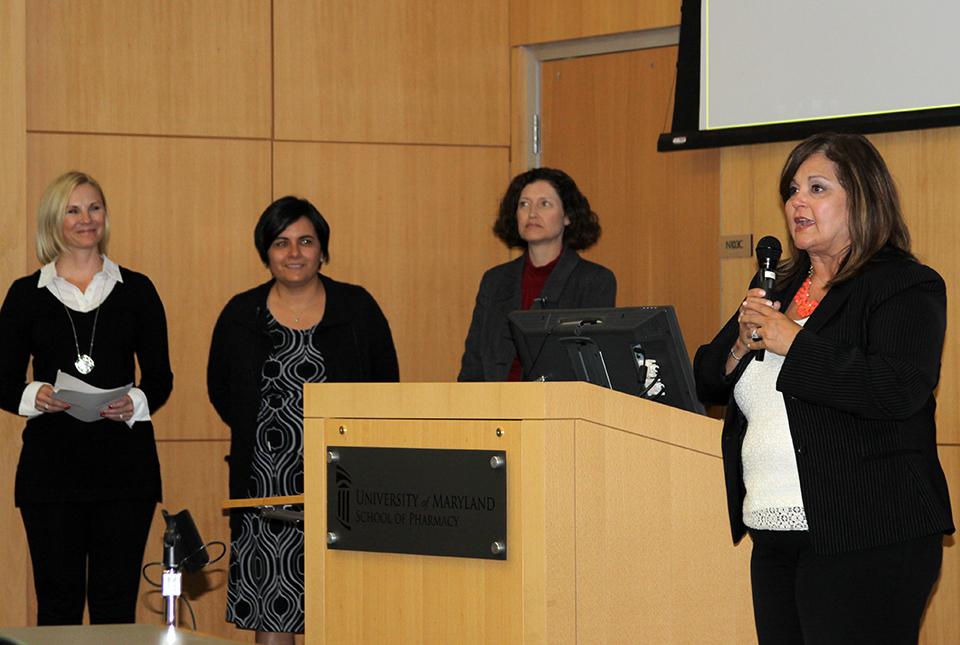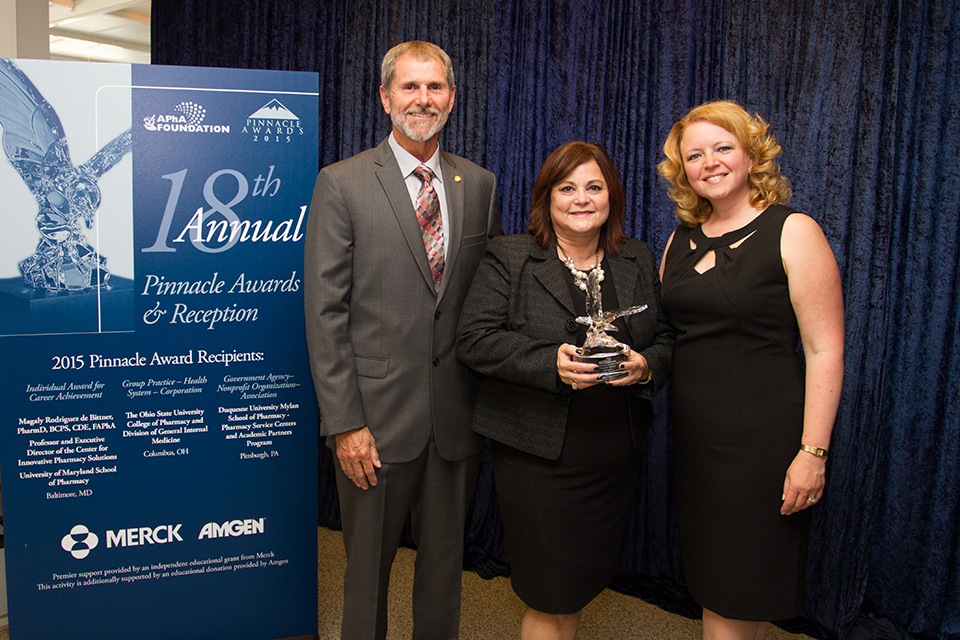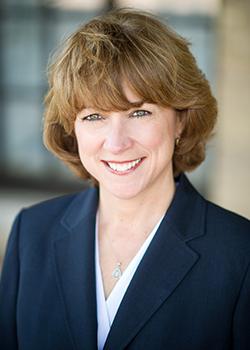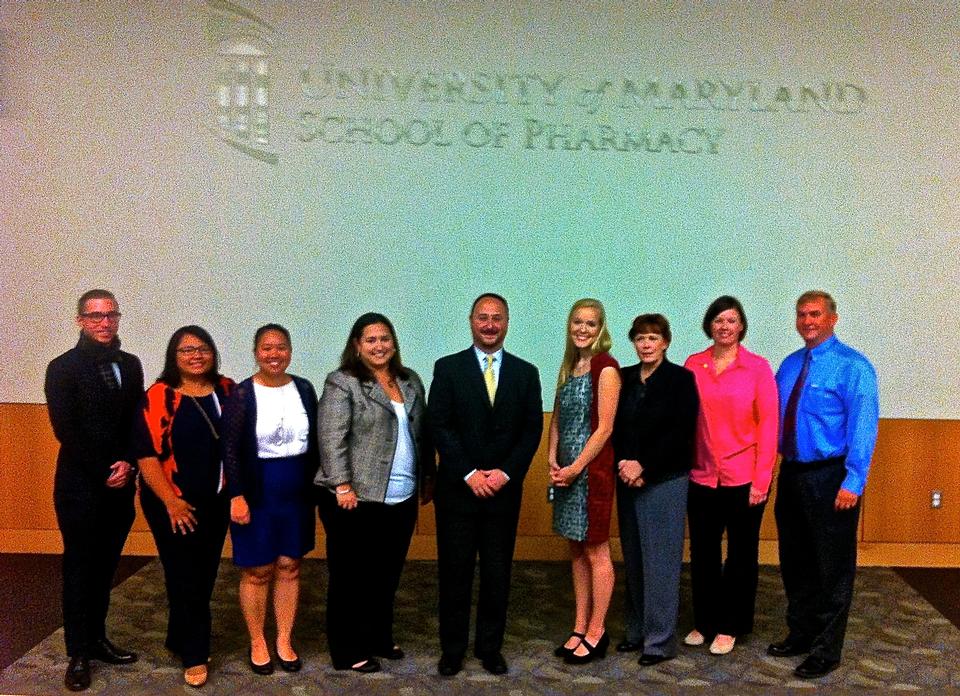SOP Hosts APhA Foundation’s Inaugural Pinnacle Awards Lecture
Presented by El Rio Community Health Center – a 2014 Pinnacle Award recipient – this lecture spotlighted best practices in pharmacy practice innovation.

By Malissa Carroll
September 30, 2014
Faculty, staff, and students from the University of Maryland School of Pharmacy gathered in Pharmacy Hall on Sept. 17 for the American Pharmacists Association (APhA) Foundation’s inaugural Pinnacle Awards Innovations in Pharmacy Practice Lecture. Presented by representatives from El Rio Community Health Center, a 2014 Pinnacle Award recipient, the lecture spotlighted best practices in pharmacy practice innovation, raising awareness about how clinical pharmacy services can be implemented within health care organizations.
“The School of Pharmacy is pleased to partner with the APhA Foundation to host its inaugural Pinnacle Awards Innovations in Pharmacy Practice Lecture,” said Natalie D. Eddington, PhD, FCP, FAAPS, dean and professor of the School and executive director of University regional partnerships. “The School has a long-standing relationship with the APhA Foundation. Both of our institutions share a common goal to foster innovation in pharmacy practice, developing new models of care that allow pharmacists to practice at the top of their licensure and demonstrate their value as members of the health care team.”
The APhA Foundation established the Pinnacle Awards in 1998 to celebrate significant contributions to the medication use process. The awards are divided into three categories – individual award for career achievement; group practices, health systems, and health care corporations; and voluntary health agencies, non-profit organizations, associations, government agencies, and public-private partnerships – that recognize individuals and groups for their efforts to enhance health care quality and improve medication use among patients.
In 2010, the School of Pharmacy’s Maryland Patients, Pharmacists, Partnerships (P3) Program was presented with a Pinnacle Award for its innovative model of care that partners specially trained pharmacists with individuals working for self-insured employers to help manage chronic diseases.
“At the APhA Foundation, our mission is to improve people’s health through pharmacists’ patient care services,” said Mindy Smith, BSP, executive director of the APhA Foundation. “Each year, we celebrate individuals and groups that demonstrate excellence and innovation in pharmaceutical care through our Pinnacle Awards program. I thank the School of Pharmacy for hosting our first Pinnacle Awards Innovations in Pharmacy Practice Lecture.”
The lecture kicked-off with an overview of the El Rio Community Health Center – a large Federally Qualified Health Center (FQHC) in Tucson, Ariz. Current trends in health care, including the transition to a patient-centered model of care, and how pharmacists can leverage these trends to integrate themselves into the health care team were also examined.
“El Rio Community Health Center is the 14th largest health center of its kind in the United States,” said Sandra Leal, PharmD, MPH, CDE, FAPhA, medical director for clinical pharmacists at the El Rio Community Health Center’s Broadway Clinic. “Our health care providers care for more than 900 patients each day, working with underserved populations affected by a number of health disparities. We view this as an opportunity to integrate pharmacists into the health care team in ways that allow them to directly impact patient care.”
When the Centers for Medicare and Medicaid Services (CMS) began offering annual wellness visit coverage for Medicare patients in 2011, El Rio Community Health Center’s clinical pharmacists led outreach efforts that encouraged qualifying patients to take advantage of this service. In 2013, clinical pharmacists at the health center provided 950 annual wellness visits to patients. On average, pharmacists identified more than five preventative care and medical interventions for each patient during these visits.
“The interventions that we identified were simply missed opportunities,” said Kelly Boesen, PharmD, BCPS, clinical pharmacy coordinator at El Rio Community Health Center, who joined Leal to deliver the lecture. “Many of the problems that we identified had been overlooked because patients never voiced their concerns or providers did not ask the appropriate questions. We also identified barriers that were preventing patients from accessing care and taking their medications as prescribed, which we are now working to overcome.”
She added, “This clearly demonstrates that pharmacists have a place in primary care. Patients respond to us, and primary care providers do not have time to fit these visits, which often require an hour to complete, into their appointment schedule.”
However, Leal and Boesen noted that clinical pharmacists, at the health center and across the nation, face many challenges in their efforts to provide quality care to patients. FQHCs will soon transition to a new payment system, which could dramatically impact the success of the annual wellness visit program at the El Rio Community Health Center. Under the new payment system, only a recognized health care provider can bill for these visits. The catch — pharmacists do not currently hold provider status under Medicare.
Leal and Boesen encouraged audience members to get involved by calling or writing to their congressional representatives to voice their support for a crucial piece of legislation that would recognize pharmacists as health care providers — HR 4190. If passed by Congress, this bill would enable Medicare beneficiaries to access pharmacist-provided ambulatory-based patient care services. Pharmacists in medically underserved areas would be recognized as health care providers and reimbursed for their services under Medicare Part B.
“Without provider status, pharmacists are still not included in many important elements of health care delivery. But, you can change this,” emphasized Leal.
To listen to the full Pinnacle Awards Innovation in Pharmacy Practice Lecture presented by Leal and Boesen, please visit this webpage.



